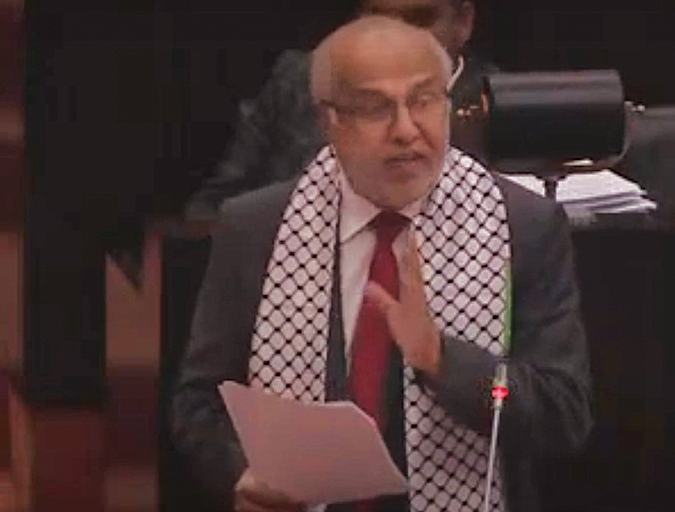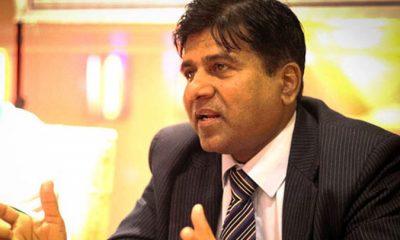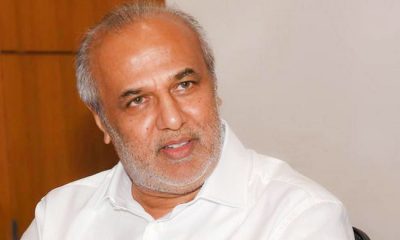News
Hakeem commends new contempt law for legal clarity

SLMC leader Rauff Hakeem told Parliament that the contempt law presented by the Government attempts to codify common law principles established through previous judgments, providing a statutory foundation for these legal principles.
Participating in the second reading debate on the Bill, the SLMC leader said that ‘Contempt of a Court, Tribunal or Institution Bill’ aimed at establishing a comprehensive legal framework for contempt of court, addressing both the specific laws on contempt and the procedures to be followed in contempt cases. The need for such legislation has been a subject of debate, with arguments surrounding the existence of constitutional provisions and other enactments penalizing contempt of court in various forms.
He said that the controversy surrounding the enactment of a specific law on contempt was reminiscent of a similar situation in India, which was resolved with the introduction of the Contempt of Courts Act in 1971. In August 2023, when the Bill was under consideration by the Supreme Court, a key argument raised was whether there was a necessity for a distinct law on contempt when constitutional provisions and other laws already addressed the issue. Notable cases, involving individuals such as Ranjan Ramanayake and SB Dissanayake, who faced consequences under Article 105(3) of the Constitution, emphasized the existing legal measures against contempt. “Apart from the constitutional provisions, there are other separate enactments that provide for contempt against individuals, for example Civil Procedure Code and Code of Criminal Procedure, Primary Courts Act, Partition Law, the Judicature Act etc,” he said.
Hakim said that despite the argument that the Parliament lacked legislative competence to enact separate legislation on contempt, the Supreme Court pointed to the Reserved List of the Constitution, which preserves the right to pass specific laws on contempt. This constitutional provision has been in place since the enactment of the 13th Amendment, allowing for subsequent legislation in the realm of contempt of court.
Moving beyond the legal intricacies, the Bill seeks to bring clarity to the offense of contempt, which has historically been surrounded by uncertainty. Past cases, such as that of Armond de Soza in 1914, highlighted the ambiguity in determining what constitutes contempt. The offence of contempt has always been in a state of uncertainty, while some acts amount to contempt, others did not do so. We remember the old case where an editor of a newspaper was summoned and punished for contempt for writing about judges spending in their time in Nuwara Eliya.
He captioned his article as ‘Justice on holiday.’ He pointed out in public spirit, as he claimed, that judicial time was being wasted. But the judges of yesteryears would not let him go scot-free, I remember the case in the matter of Armond de Soza, Editor of Ceylon Morning Leader in 1914, reported in 18 NLR 33. This judgment presents one important aspect of the law of contempt of court. I quote here: “There is no doubt to the right of the members of the public to criticize and to criticize wrong judicial decisions or judicial work and to bring to the notice of proper authorities any charge whatsoever of any alleged misconduct of the part of the judge.”
The Bill attempts to codify common law principles established through previous judgments, providing a statutory foundation for these legal principles.
One notable aspect addressed by the Bill is the definition and prohibition of acts amounting to contempt, such as willful disobedience to court orders and breach of undertaking given to the court. By doing so, the legislation aims to formalize and standardize the criteria for contempt of court. The Bill now provides for some acts to be of contempt of court such as willful disobedience to any judgment, decree, direction, order, writ or other processes of court will amount to contempt of court.
The SLMC leader said that the inclusion of the offense of scandalizing judicial authorities has raised concerns. While the Supreme Court has upheld its constitutional validity, critics argue that the vague contours of this provision leave individuals at the mercy of judges’ discretion. The potential for abuse and the subjective nature of determining what constitutes scandalization prompt a call for a reevaluation of this particular provision.
Hakeem said that the historical context provided through Lord Denning’s anecdote highlights the importance of judges exercising leniency and not using contempt powers to uphold their own dignity. The Bill acknowledges the need to define proper contours for the offense of contempt, aligning with constitutional provisions that restrict freedom of speech to prevent contempt of court.
He said that Bill aims to address the longstanding need for a comprehensive legal framework on contempt of court. While it codifies existing legal principles, concerns regarding the provision on scandalizing judicial authorities warrant careful consideration and potential revision. The legislation acknowledges the delicate balance between preserving freedom of speech and safeguarding the authority of the judiciary.
“This freedom cannot be the freedom of wild ass. Article 15 (2) of our Constitution specifically states that we cannot exercise freedom of speech to commit contempt of court. This was a long-felt need to have defined proper contours of the offence of contempt. I thank the Minister for bringing this law,” Hakeem said.
News
US sports envoys to Lanka to champion youth development

The U.S. Embassy in Colombo welcomed the U.S. Sports Envoys to Sri Lanka, former National Basketball Association (NBA) and Women’s National Basketball Association (WNBA) players Stephen Howard and Astou Ndiaye, from June 8 through 14.
The Public Diplomacy section of the U.S. Embassy said that it would launch a weeklong basketball program intended to harness the unifying power of sports, made possible through collaboration with Foundation of Goodness and IImpact Hoop Lab.
While in Sri Lanka, Howard and Ndiaye, both retired professional basketball players, will conduct a weeklong program, Hoops for Hope: Bridging Borders through Basketball. The Sports Envoys will lead basketball clinics and exhibition matches and engage in leadership sessions in Colombo and Southern Province for youth aged 14-18 from Northern, Uva, Eastern and Western Provinces, offering skills and leadership training both on and off the court. The U.S. Envoys will also share their expertise with the Sri Lanka Basketball Federation, national coaches, and players, furthering the development of basketball in the country. Beyond the clinics, they will collaborate with Sri Lankan schoolchildren to take part in a community service project in the Colombo area.
“We are so proud to welcome Stephen and Astou as our Sports Envoys to Sri Lanka, to build on the strong people-to-people connections between the United States and Sri Lanka,” said U.S. Ambassador Julie Chung. “The lessons that will be shared by our Sports Envoys – communication, teamwork, resilience, inclusion, and conflict resolution – are essential for leadership development, community building, equality, and peace. The U.S. Sports Envoy program is a testament to our belief that sports can be a powerful tool in promoting peace and unity.”
News
Rahuman questions sudden cancellation of leave of CEB employees

SJB Colombo District MP Mujibur Rahuman in parliament demanded to know from the government the reasons for CEB suspending the leave of all its employees until further notice from Thursday.
MP Rahuman said that the CEB has got an acting General Manager anew and the latter yesterday morning issued a circular suspending leave of all CEB employees with immediate effect until further notice.
“We demand that Minister Kanchana Wijesekera should explain this to the House. This circular was issued while this debate on the new Electricity Amendment Bill was pending. There are many who oppose this Bill. The Minister must tell parliament the reason for the urge to cancel the leave of CEB employees,” the MP said.However, Speaker Mahinda Yapa Abeywardena prevented Minister Wijesekera responding to the query and said that the matter raised by MP Rahuman was not relevant.
News
CIPM successfully concludes 8th Annual Symposium

The Chartered Institute of Personnel Management (CIPM) successfully concluded the 8th Annual CIPM Symposium, which took place on 31st May 2024. Themed “Nurturing the Human Element—Redefining HRM in a Rapidly Changing World,” the symposium underscored the pivotal role of human resource management (HRM) in today’s dynamic global landscape. Since its inception in 1959, CIPM has been dedicated to advancing the HR profession through education, professional development, and advocacy, solidifying its position as Sri Lanka’s leading professional body for HRM.
Ken Vijayakumar, the President of the CIPM, graced the occasion as the chief guest. The symposium commenced with the welcome address by the Chairperson, Prof. Arosha Adikaram, followed by the Web Launch of the Symposium Proceedings and Abstract Book by the CIPM President. The event featured distinguished addresses, including a speech by Chief Guest Ken Vijayakumar, President of CIPM, and an address by Guest of Honor Shakthi Ranatunga, Chief Operating Officer of MAS Holdings Pvt. Ltd., Sri Lanka.
The symposium also featured an inspiring keynote address by Prof. Mario Fernando, Professor of Management and Director of the Centre for Cross Cultural Management (CCCM) at the University of Wollongong, Australia.
Vote of Thanks of the inauguration session was delivered by Dr. Dillanjani Weeratunga, Symposium Co-chair.
The symposium served as a comprehensive platform for researchers to present their findings across a wide range of critical topics in HRM. These included Cultural Diversity and Inclusion, Talent Development and Retention, Ethical Leadership and Corporate Social Responsibility, Adapting to Technological Advancements, Mental Health and Well-being at Work, Global Workforce Challenges, Employee Empowerment, and Reskilling and Upskilling.
The plenary session was led by Prof. Wasantha Rajapakse. Certificates were awarded to the best paper presenters during the valedictory session, followed by a vote of thanks delivered by Kamani Perera, Manager of Research and Development.
The annual symposium of CIPM was a truly inclusive event, attracting a diverse audience that spanned undergraduates, graduates, working professionals, research scholars and lecturers. This widespread interest highlights the symposium’s significance in the field of HRM, offering a unique opportunity for everyone to network and learn from scholarly brains.The CIPM International Research Symposium was sponsored by Hambantota International Port, Sri Lanka Institute of Information Technology (SLIIT), E B Creasy & Co. PLC, and Print Xcel Company.
















